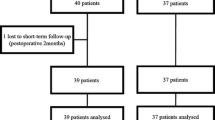Abstract
Background
Stapled haemorrhoidopexy (SH) is associated with low postoperative pain but, when performed for advanced piles, carries high recurrence rates. The aim of our study was to assess our long–term results after SH for third–degree haemorrhoids.
Methods
A total of 126 consecutive patients (67 men and 59 women) with third–degree haemorrhoids underwent SH in our unit between 1998 and 2002. Of these, 120 (95.2%) were followed up in the outpatient department after a median interval of 61.5 months (range, 38–84 months).
Results
During the postoperative period, 7 patients (5.8%) experienced pain for 5–12 days, which was treated with oral analgesia. Seven patients (5.8%) experienced gas incontinence and one of them also reported soiling; the incontinence subsided within 2–8 weeks. Recurrence of the haemorrhoidal disease occurred in 8 patients (6.6%).
Conclusions
SH is a safe, low–pain and, in the long–term, effective technique for the treatment of third–degree haemorrhoids.
Similar content being viewed by others
Author information
Authors and Affiliations
Corresponding author
Rights and permissions
About this article
Cite this article
Kanellos, I., Zacharakis, E., Kanellos, D. et al. Long–term results after stapled haemorrhoidopexy for third–degree haemorrhoids. Tech Coloproctol 10, 47–49 (2006). https://doi.org/10.1007/s10151-006-0250-9
Received:
Accepted:
Published:
Issue Date:
DOI: https://doi.org/10.1007/s10151-006-0250-9



